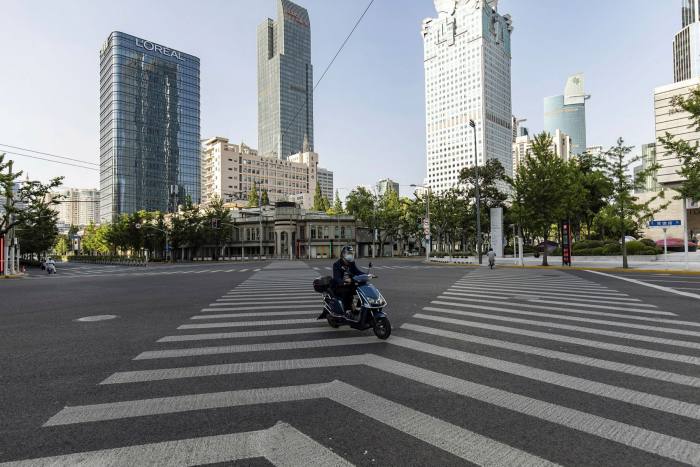Ascension beckoned for Li Qiang.
Shanghai’s top official seemed only months away from securing one of the seven positions on the politburo standing committee, China’s most influential political body, as his longtime patron Xi Jinping prepared to secure a third term as leader in November.
Yet in China’s most modern and one of its best-run cities, weeks of brutal lockdowns have descended into a surreal crisis, with signs that faith in the Communist party’s ability to govern has been eroded.
Fears of families being torn apart under a draconian quarantine system have coupled with a torrent of administrative botches and rising dissent: a body mistakenly stuffed inside a body bag while the person was still alive; piles of undelivered food rotting outside apartment compounds even as people have worried about going hungry as they struggled to obtain essentials; the careful staging of nightly protests, with residents singing or banging pots, and rare clashes between citizens and police.
While many of the city’s 25mn residents blame their enforced isolation on Xi and his zero-Covid policy, the future of Li and other top lieutenants hangs in the balance as pressure mounts on Beijing to find a scapegoat for the chaos and embarrassment.
The question weighing on Xi is what to do with Li, a close ally for two decades after the pair worked together in Zhejiang in the early 2000s, and Shanghai mayor Gong Zheng. The decision will ripple through the party and return an unwanted spotlight to secretive infighting as a clutch of rising cadres compete for the coveted top government positions.

“More and more voices are rising in Shanghai and inside the party, especially coming from [vice-premier] Han Zheng, asking Xi to force Li to step down,” said Alex Payette, chief executive of Cercius Group, a consultancy that specialises in elite Chinese politics. Han is a politburo standing committee member and is considered a rival to the Shanghai party secretary to replace Li Keqiang as premier next year.
Payette believes Li’s ousting would cause “an earthquake” inside the party, disrupting a delicate system of alliances just ahead of a twice-a-decade party congress in November, when Xi’s third term is expected to be secured and the new politburo line-up unveiled.
“If Xi were to sacrifice Li, the message sent to his other allies [and current politburo members] like Chen Min’er, Ding Xuexiang and Cai Qi is that no one is safe and untouchable . . . We expect Xi to bargain with other factions inside the party to keep Li in play, despite the ongoing Shanghai fiasco — though the same cannot be said for Gong,” Payette added.
Victor Shih, a professor of Chinese political economy at the University of California, San Diego, said protection for the city’s leadership might stem not only from close ties with Xi but also from the Chinese leader being obscured from the true fallout from his zero-Covid policy.
“We don’t know the extent to which Xi Jinping sees the full extent of the lockdown policies in Shanghai; whether he knows that large numbers of people are going hungry,” he said. “We don’t know what kinds of information Shanghai is feeding to the central government. He is surrounded by private secretaries filtering information to him before it lands on his desk.”
Analysts at Cercius also noted that while former Hubei party secretary Jiang Chaoliang and former Wuhan party secretary Ma Guoqiang were removed from their posts over the initial coronavirus outbreak two years ago, both men “survived”. No probe by the party’s internal discipline unit was launched and they were not expelled from the party.

Still, Payette said, as calls for accountability mount, political pressure might mean that Li does not follow his predecessors in rising from Shanghai to the politburo standing committee and instead is “appointed elsewhere in the central party apparatus”.
China’s return to citywide lockdowns in response to the spread of the Omicron coronavirus variant has wreaked widespread damage across the world’s second-biggest economy. The measures have choked domestic and international supply chains and sparked a series of stimulus measures as hopes fade of reaching growth of 5.5 per cent this year — its lowest target in 30 years.
But Xi has refused to back down on the zero-Covid policy. A stunning report from a politburo standing committee meeting chaired by the president on Thursday warned against “any slackening in the control efforts” and stressed the importance of “resolutely fighting any attempts to distort, question or dismiss China’s anti-Covid policy”.
While frustrated with the local authorities, many in Shanghai, however, ultimately blame the central government in Beijing for the hardships they are enduring.
“The Shanghai government officials were consistent at the beginning,” said a Shanghainese in her forties, who asked not to be named because of fears for her safety. “They didn’t want to do a strict lockdown because the economic price is so high. What they said and did was consistent. The strict lockdown was imposed by the central government.”
She added that the realities of life under lockdown had led a generation of younger people — who had grown up during a period of prosperity — start to reassess the wisdom of China’s political system. “Attitudes towards the Chinese government have changed,” she said.
Diana Fu, an expert on China’s domestic politics with the Brookings Institution think-tank, notes that from imperial China to the Xi era, a ruler’s legitimacy has always relied on providing social goods.
“The party’s contract with society rests on guaranteeing not political rights but social rights — basic food, housing and healthcare to people … Digital posts about starvation in one of China’s most prosperous cities — Shanghai — are effectively sounding an alarm bell that the party-state is not keeping up its end of the social contract,” she said.

